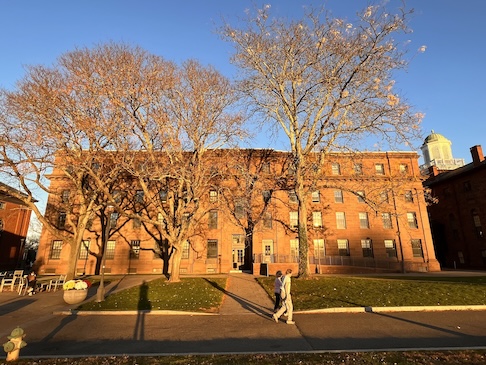
c/o Sam Hilton
The Compensation and Benefits Committee (CBC) and the Wesleyan chapter of the American Association of University Professors (AAUP) held a forum for faculty and staff to discuss compensation and benefits on Thursday, Oct. 24. The meeting occurred in the midst of ongoing discussions between faculty and University administration surrounding faculty and staff salaries.
The CBC is a standing faculty committee responsible for working with administration on the University budget, and is composed of eight elected faculty and staff. The Wesleyan AAUP is an advocacy group that works on faculty issues and is independent from the University structure.
“We, just of our own ‘goodwill,’ are working on behalf of faculty issues and are bringing things, both through our standing committees and just independently, to try and talk change,” Associate Professor of the Practice in Molecular Biology and Biochemistry (MB&B), CBC member, and Wesleyan AAUP co-president Cori Anderson said.
Around ten faculty members attended the meeting at Shanklin Hall in person, while others joined by video conference. Issues such as compensation, immigration support, funding, fellowships, health care, housing, and retirement benefits were mentioned by the faculty members in attendance.
“We did this last [academic] year, and I think this is just a good thing to do in general,” Associate Professor of Mathematics and AAUP Secretary David Constantine said. “So there’s nothing immediately on the front burner, although some of the issues…like housing, are things that have tended to be particularly acute the last few years. But for the CBC to do their work, kind of getting a feel from the faculty of what their concerns are, what they’d like their elected committees to advocate for now, towards the beginning of the year, will help them do their work over the course of the year.”
Housing issues have continued to be a point of concern for faculty and staff at the University. Last year, a CBC housing survey was one of the most well-participated CBC surveys among the faculty. Forum attendees touched on housing shortages and mentioned specific problems such as mortgage benefits and a lack of available rentals around campus.
“It’s quite clear, given the nationwide housing crisis which we’re not immune to here, that housing concerns are very important, particularly for our younger faculty members,” Professor of MB&B and CBC chair Donald Oliver said at the meeting.
University administration has also recognized the local housing situation as an ongoing difficulty.
“Housing is something we’re thinking a lot about right now,” Provost Nicole Stanton said. “It’s a critical issue for the state of Connecticut, too. The governor [of Connecticut] actually visited our campus and said that this was one of the biggest crises that he felt he was facing. So I think this is something that we’re feeling as a community, and that we’re going to be thinking about and trying to work on. That means there aren’t very many houses around here. It is hard to find a place to live, and housing in Connecticut, both purchase and rental, is very expensive, so we have quite the crisis here.”
Compensation issues were also mentioned by those present. Some criticized the merit system, which provides employees with annual salary increases based on merit using guidelines determined by the University president and cabinet and recommendations of the employee’s supervisor or department head. Additional complaints touched on the the visiting professor pay structure and current fellowship support. One of the most-discussed topics was the lagging of salaries behind the median, as measured at around sixteen peer institutions.
“We view our core mission as a fair rate of compensation for our colleagues,” Oliver said. “In analysis of the data, it’s kind of clear that at least the associate professor and assistant professor categories at Wesleyan have been behind our peer school median for a number of years. The good news is that full professors are really pretty much right on the median for many years. So our attentions are turned more to those other faculty categories.”
The administration meets regularly with the CBC to discuss and collaborate on the issues mentioned at the forum as part of their joint budget oversight.
“This year, we’re actually meeting more than we have in the past,” Stanton said. “Typically, it’s around once a month or so. This year we’re meeting twice a month. I am a committee member, as is written into our faculty handbook, and we start communicating with the chair and other members in the summer about critical issues that are going to be coming up, some things that are time-sensitive. We regularly share data and information if there’s research that the faculty would like to know more about.”
Stanton sees the well-being of faculty and staff as beneficial to all, including students.
“We want our faculty colleagues to be able to feel like they are able to live in a community that they want to live in, where they belong, where they can have the kinds of lives that they want to, because then that means they’ll want to stay,” Stanton said. “They’ll want to be a part of the community, they’ll want to be community members, and that is a tremendous benefit for the students.”
Spencer Landers can be reached at sklanders@wesleyan.edu.